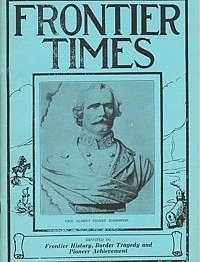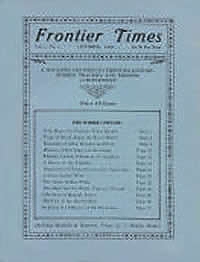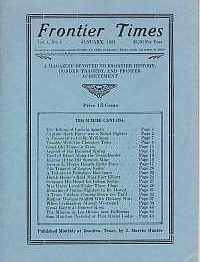By using our website, you agree to the use of cookies as described in our Cookie Policy
Magazines & Instant Downloads
Vol 07 No. 08 - May 1930
General Albert Sidney Johnston In Texas
Colonel M. L. Crimmins, Fort Sam Houston, Texas
This is an excellent and fairly lengthy biographical account of Johnston’s exploits in Texas prior to his death at the Battle of Shiloh in Tennessee, April 6, 1862, while commanding the Confederate forces with the rank of general. Thus, in the full bloom of his manhood, the greatest soldier of the Confederacy died. He belongs to that group of American heroes, Washington, Jackson, and Lee. At the moment of victory the hand of death snatched him from the field of triumph and the cause of the Confederacy was lost. He died as he wished, serving his country on the field of battle in a cause which he believed was right.
Mentions:Mentions: Alexander Hamilton * John Johnston, the son of Archibald * Abigal Harris * Black Hawk * Mr. Groce * General Felix Huston * General James Hamilton * Fort Jesup * Edmund P. Gaines * the Brig, "Morroco ". * Dr. Davidson and Dr. Luzenburg * Henry D. Gilpin * Edward D. Hobbs * Barnard E. Lee * Chief Essowakkanny and Chief Essomanny * Hon. Peter W. Grayson * Gen. Thomas J. Rusk * General Edmund P. Gaines * Judge Burnet * General Vasquez * Colonel John C. Hays * General Adrian Woll * General Somerville * Clay Davis * Miss Eliza Griffin * China Grove plantation * Shelbyville * Major-General William O. Butler * Major Hardee * General David E. Twiggs * General Edwin V. Summer
Maximilian's Ill Fated Adventure
By Frank H. Bushick
The reign, fall and execution of the Archduke Maximilian as Emperor of Mexico has furnished writers and casuists with two interesting themes of argument and speculation. Was the shooting of the helpless Emperor by his captors unwarranted murder, or was it a just retribution to a usurper necessary to the welfare of Mexico. Would Maximilian have succeeded and his empire lasted had he accepted the services of an army of Confederate soldiers who offered to join him after the collapse of the Confederacy?
Maximilian was born in 1832 and was the younger brother of the late Emperor Francis Joseph of Austria. He married Princess Charlotte, the beautiful daughter of the late King Leopold I, of the Belgians. It was a love match and Maximilian and his bride started life under the happiest auspices. Both of them were related to half the reigning sovereigns of Europe and they lived happily in a castle at Miramar, near Trieste, on the beautiful Adriatic Sea. The young couple, it appears, were not content with wealth and happiness, but were ambitious to wear a crown and maintain a court of their own. Thus begins the sad tale told in this excellent account.
Further Mentions: the Emperor Louis Napoleon III of France * General Escobedo * two devoted generals who remained faithful to him, Mejia and Miramon * General E. Kirby Smith * Colonel A. W. Slayback * Buena Vista * General Zachary Taylor * Marshal Bazaine * Colonel John M. Edwards * General Sterling Price of Missouri * Governor Reynolds of Missouri, General Lyon of Kentucky, General McCausland of Virginia * General Hamilton P. Bee
I CAN REMEMBER
I am not so old but what I can remember when we got that train in West Texas. And I can remember when dresses were dresses, and the sight of a girl's ankle was as rare as a democratic victory.
I can remember when there wasn't an ice factory west of Fort Worth, and there wasn't any ice except in winter, I can remember when houses were not screened, and I had to fan the flies away from pa while he took an afternoon nap. Every day at dinner one of us kids had to mind the flies off the table while the grownups ate. We had breakfast before day, and ate supper by a lamp light, in those days.
I remember when the preacher and the Smiths and Jones' were invited to our house for Sunday dinner and supper, and I was picky to get to eat at the third table. I remember when ma and the girls would bake all day Saturday. Folks would always apologize when they didn't have anything to eat but four cakes, twelve pies, a boiled ham, seven kinds of preserves, and, five fried chickens…
WOMAN WHO LIVED AT TIME OF BURNET INDIAN KILLING, DIES
Living memory of the Indians' massacre of the Whitlock family at Packsaddle Mountain in Burnet County and the lifelong search for a boy kidnapped by the red men, was erased in the death of Mrs. Mary McQueen, at London, Texas, sister of the slain Mrs. Whitlock. This is a brief account of the pioneer woman.
Further Mentions: Mrs. S. P. Garrett and other Burnet relatives * George Cooper of New Boston, Henry and Ed Cooper * Bowie County
SWORD OF COL. WALLER EXHIBITED
Mentions: the Lockhart Fair * Col. Edward Waller, Jr * Edwin Waller III, son of Col. Waller * Judge Edwin Waller
The Adventures Of Big-Foot Wallace
By John C. Duval. First Published in 1870
IN 1867, WHILE temporarily sojourning in the city of San Antonio, I had a severe attack of fever, from the effects of which I recovered but slowly. Thinking that fresh air and exercise would aid me in regaining my health and strength, I mounted my horse one fine morning in the latter part of October, and set out for the "ranch" of my old messmate and compadre, "Big-Foot Wallace," who held an uncertain tenure upon a tract of pasture land, situated on the Chacon, one of the headwaters of the Attascosa. I say, uncertain, for his right to and possession of the same was constantly disputed and ignored by predatory bands of savages, and Mexicans, and horse thieves of all color, grades, and nations.
Toward sundown, from the top of a, considerable hill, I came in sight of Wallace's little ranch, snugly ensconced at the bottom of a valley, near the margin of a small lake, and protected from the northern blasts by a beautiful grove of spreading live-oaks. As I rode up I discovered Wallace under one of these trees, engaged in the characteristic occupation of skinning a deer, which was hanging head downward, suspended from one of its lower branches. Wallace did not recognize me at first, for it was many years since we had last met; but, as soon as I made myself known to him, he gave me a cordial shake of the hand, and invited me into his ranch, where, in a short time, he prepared a supper, to which I sat down, "nothing loath," for my appetite was sharpened by my long day's ride.
I staid with Wallace two weeks, or thereabouts, hunting, fishing and riding around during the day, and entertained each night with "yarns" of his numerous "scapes and scrapes, by flood and field." Many years previously, when Wallace and I were messmates together, in the first Ranging Company, enlisted in the service of the "Old Republic," under Colonel Jack Hays, I asked his consent to write out a narrative of his "adventures," to be published for the benefit of the public generally. But he seemed so much opposed to my doing so, that I did not press the matter upon him. His reasons for refusing to accede to my request were characteristic of the man. He did not think the public would be interested in the history of one so little known; and, even if he had vanity enough to believe otherwise, he had not the least desire to see himself figuring in print. I determined once more to approach him on the subject, and this time I bad better success than formerly, for finally, though evidently with reluctance, he consented that I should publish the following narrative of his adventures in Mexico and on the frontiers of Texas...
This is the first of a fifteen-part installment series of this quintessential Texan hero, frontiersman, Indian fighter, soldier, patriot and Mier captive. Duval does a masterful job capturing the character and uniqueness of the man and advantageously borrows heavily from Wallace’s own personal diaries, quoting from them at length. Wallace, from the old Scottish hero-heritage of the Wallace and Bruce clan, carried his noble blood to many escapades of which the history of the great state of Texas will forever be grateful and stands proud to call him one of her own sons...
(Continued Next Month) We can supply you with the rest of this great series – just email us for details.
SPY ROCK NEAR MASON ONCE WAS INDIAN LOOKOUT
Mentions: Enchanted Rock in Gillespie county * Honey Creek
Many Texas Cities Have Vanished
A. T. Jackson
Scores of Texas towns and villages sprang up and flourished for a time then were abandoned and fell into decay. Some never outgrew the village class, but others were at one time places of 5,000 to 10,000 inhabitants. This is the story of some of those at one time, great cities.
Mentions:Mentions: Indianola, situated on an island in Matagorda Bay * Powder Horn * The Morgan Steamship Line * Victoria * Cuero * Ben Fickland * Tom Green county * Texanna was at one time the county seat of Jackson county * One of the most unusual settlements made in Texas was that of a German colony located below the village of Castell on the north bank of the Llano river * Bettina * Bettina von Arninm * Prince Solms * Fredericksburg * the Adelsverein, a society for the protection of German emigrants * Mountain City, in Hays county, after an existence of some 35 years, was doomed to desertion because a railroad missed the town by three miles * Comanche Springs McLennan county * McGregor * In 1872 Lampasas and Mills counties were one * Rube Senterfitt * Salt Creek * The town was named Senterfitt * Lometa *
Maximilian's Treasure At "Castle Gap"
Sad tale of mysterious fortunes, a sad deposed emperor and some ruthless outlaws.
Mentions: Queretaro * patriotic Indian, Benito Juarez * the mad, forlorn Empress Carlotta * the Chihuahua Trail to Pressidio del Norte on the Rio Grande. * Horsehead Crossing * the' James boys * Denton * Fort Concho * Doctor Black a resident of Denton * lawyer named O'Connor *
Moulton Institute One Of First Schools In Texas
Gertrude Harris Cook
THIS ARTICLE IS EXCELLENT, EARLY MOULTON & LAVACA COUNTY HISTORY
Tucked down in a corner of Lavaca County, about 100 miles east of San Antonio, dozing under the shade of great spreading live-oaks lies the sleepy little settlement of Old Moulton. It is now practically a deserted village, but at one time it was a thriving community center for all the rich farming country around a gathering place for many of the first-families of pioneer days in Texas; a city of wonders in the childhood memories of many of the prominent citizens of today.
The little settlement was first named about the year 1852.
The Winters family came out to Texas in 1834. It took them two months to come from Mississippi-because they walked all the way. In 1852, Uncle Jim Winters came on from East Texas and set up a store. He called the place Moulton because a man came along from Alabama. and suggested the name. One of the Winters girls, Sally, became "Grandma" Crouch of Texaswide fame. She lived to be 96 years old, and left a long line of descendants scattered all over Texas.
Many a pioneer family, seeking a new home in Texas after the war between the states swept away their fortunes, stopped when they reached the beautiful hills of Lavaca County, and made camp under the post oaks and black jacks, and decided they could find no better place to build their homes. They planted their broad acres of cotton and corn, and looked around for a place to build their churches and schools. They thought "Uncle Jim" had found a likely place on the tree-covered knoll at" the crossroads, so they decided on Moulton. They built a Methodist church, a Baptist, and a Hardshell church. There was a postoffice, a blacksmith shop, and a Masonic hall; and then came the school that dominated the community for a quarter of a century, and sent out its hundreds of well educated men and women to bless our great state.
Further Mentions: Professor Allis and gentle "Aunt Thank" * Old Moulton Institute * Prof. Melvin H. Allis, M. A., came to Texas in 1857 * Rochester University * Gonzales College * Rock Island prison * Miss Thankful Hannah McClure * Prof. W. C. Buckman of the San Antonio Business College * Miss Sallie McClarin of Hallettsville * John T. Graham of Waelder * Peacock's School * Mrs. E. W. Walker and Mrs. Otlro Askey * Ozarkwood, Texas * the Kokernuts and the Vanham families * "Little Herby," * Herbert Kokernut * Lizzie Vanham * the Crouches, the Moores the Arnhams and the Dockerys. * J. W. Crouch * Sally McGinty * the Sam and Will Moore Institute * Fanny Dockery * John Arnham * a ranch out near Boerne * the Harris family * the McGintys and the Murphys * George C. Harris * Nannie McGinty * Mesdam Elizabeth Farm * Emma (J. B.) Cook * Ruth (J. A.) Morris * Navarro School * Jim Murphy * Georgia McGinty * John Murphy * Pearl Thornton * Alvin, Texas * The Thorntons, Buntings, Burketts, Hughes, Willifords were all prominent families of old Moulton * Jake Burkett became one of the most prominent Baptist ministers of the State * Mollie Williford * Rose Thornton * Lee Bunting * Dr. A. Stamps of San Marcos * Joe Brown * Lee Tollerson became Mrs. Toni Kerr of San Antonio * Joe Nations married Ida Hicks * Mrs. Honto Hicks Tooly * Theodore Ardoin * Mrs. Jullia Ardoin Lochausen *
Recalls Early Elections In Uvalde County
H. W. Baylor
Mr. Baylor offers first-hand account of experiences as County Commissioner and later Sheriff of Uvalde County in early days.
Mentions: His being elected county commissioner of Uvalde County in 1882. Ben Boatright was then sheriff and McCormick was county judge. The other commissioners were Harvey Alexander from Con Can, Henry Patterson from Sahinal, and A. B. Dillard from Uvalde. * the Bull Pen * Montell * The Dry Frio box had 21 votes * Market Square *
A WEST TEXAS PIONEER
James Moore
J. R. Pettitt, subject of this sketch was born on Peach Creek, Gonzales County, Texas, January 11, 1863, the town of Rackfort. being the postoffice. Later the family moved to San Marcos, Hays County, where they resided for two years, moving from there in 1872 to Kerr County, locating on the Guadalupe river no great distance from the present site of Kerrville. While the family lived in Kerr County Mr. Pettitt states he had occasion to receive his first scare of the Indians which at that time made monthly visits to some portions of the state. Here, from neighbors living not a great way off, the Indians stole two boys, carrying them out of the country. Jash Welch, Andy Wilson and George Nickels and others followed the Indians with a view to recovering the stolen boys, but their efforts were of no avail. Moving from Kerr County, the Pettitt family located not far from where Vance now stands, and at the foot of Bullhead Mountain.
Further Mentions: the family moved to Kendall County where they resided until 1879 * he returned to Texas in 1890 he moved to Junction, Kimble County. It was there he began his career as a cowboy * Sam Hunter *
TWO POUNDS TOBACCO BUYS LAND
NOW HERE, IN THIS BRIEF ACCOUNT, IS SOME GOOD EARLY JUNCTION, AND KIMBLE COUNTY, TX HISTORY!
Because he traded two pounds of tobacco for a block of ground in Junction and because he opened up a combination grocery store, feed store, wagon yard, camp house and blacksmith shop on this ground, Mr. Sam Jobes received the distinction of owning and operating the first business in Junction. The first business house was built of wood and was painted red...
Mentions: Mr. and Mrs. Sam Jobes were the first couple to be married in Junction, and their son, Jack Jobes * Ozona * Uncle Rance * a field owned by Frank Baker * Kimbleville * Mr. John C. Kountz was ithe first school master * Mr. John Gorman was the first sheriff of Junction * Junction's first postoffice was operated in the store of Mr. E. K. Kountz * the present Hodges Hotel * . N. C. Patterson was the second mail carrier and postmaster for the county * Junction's first church was the Church of Christ * Elder John Durst * The first automobile in Junction was owned by Mr. Alex J. Hamer
CUSTER'S FOES FOUND LIVING IN FAR NORTH
New York. Indian survivors of Custer's battle on the Little Big Horn have been found among a band of Wapeton Sioux in central Saskatchewan by an expedition from the Cambrige University museum and the British museum. This is the account.
Mentions: The expedition, led by an American, Donald A. Cadzow * Robert Rymill of England and John Rymill of South Australia * The old chief, Four Stars * "Che-nmold-men" or "Long knives," * Salteaux Indians * chief named Nippy, north short of the Saskatchewan River and there it settled., is still alive, and they all call Americans after the name long ago given to American cavalrymen who carried sabers.
Death Recalls Tragic Life Of Pioneer
ANCIENT CIVILIZATION ON AMERICAN CONTINENT
The oldest city on the American continent-built a few years after the birth of Christ-now stands buried in the jungles of northwestern Guatemala…
$4.95
‹ Back








